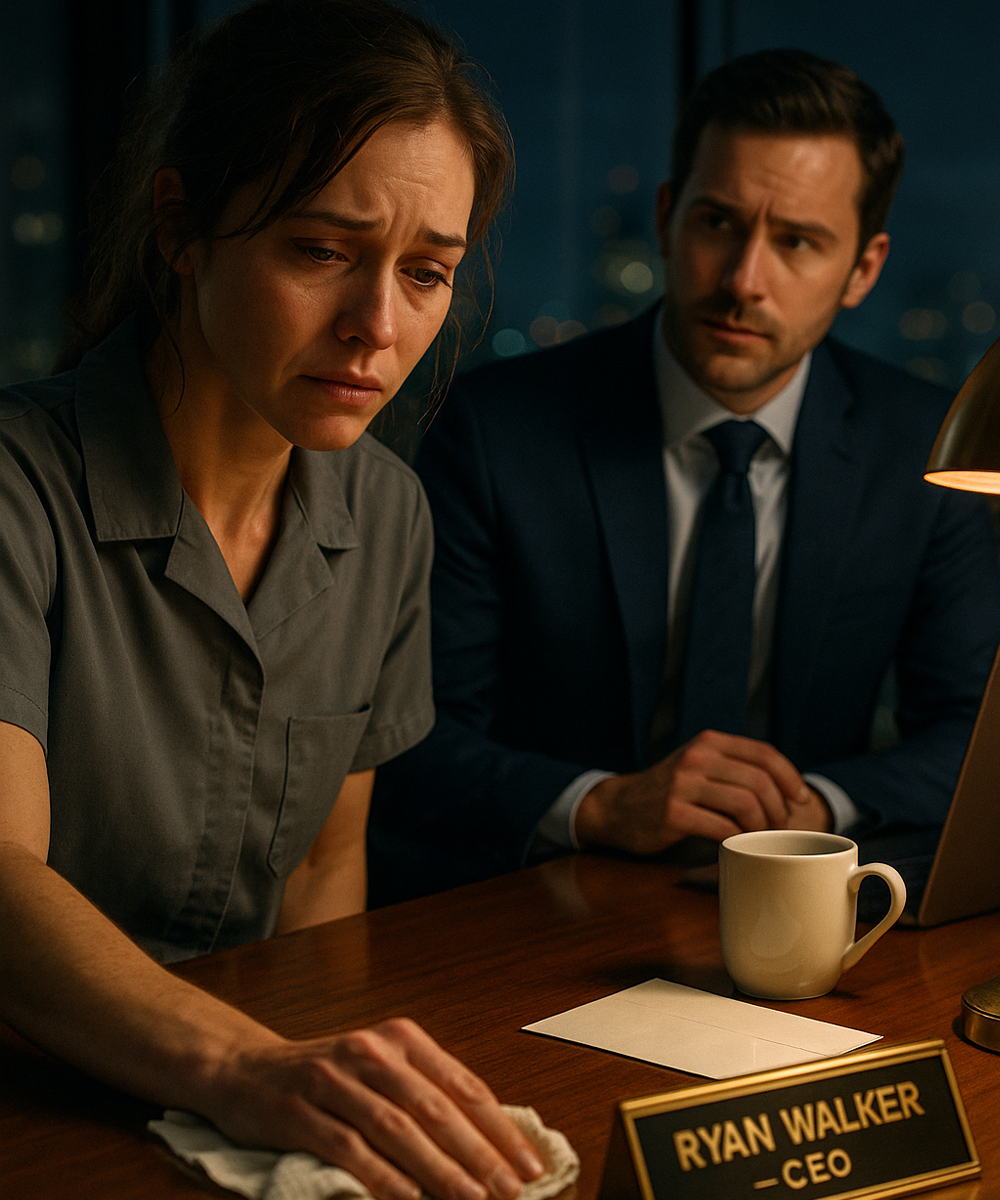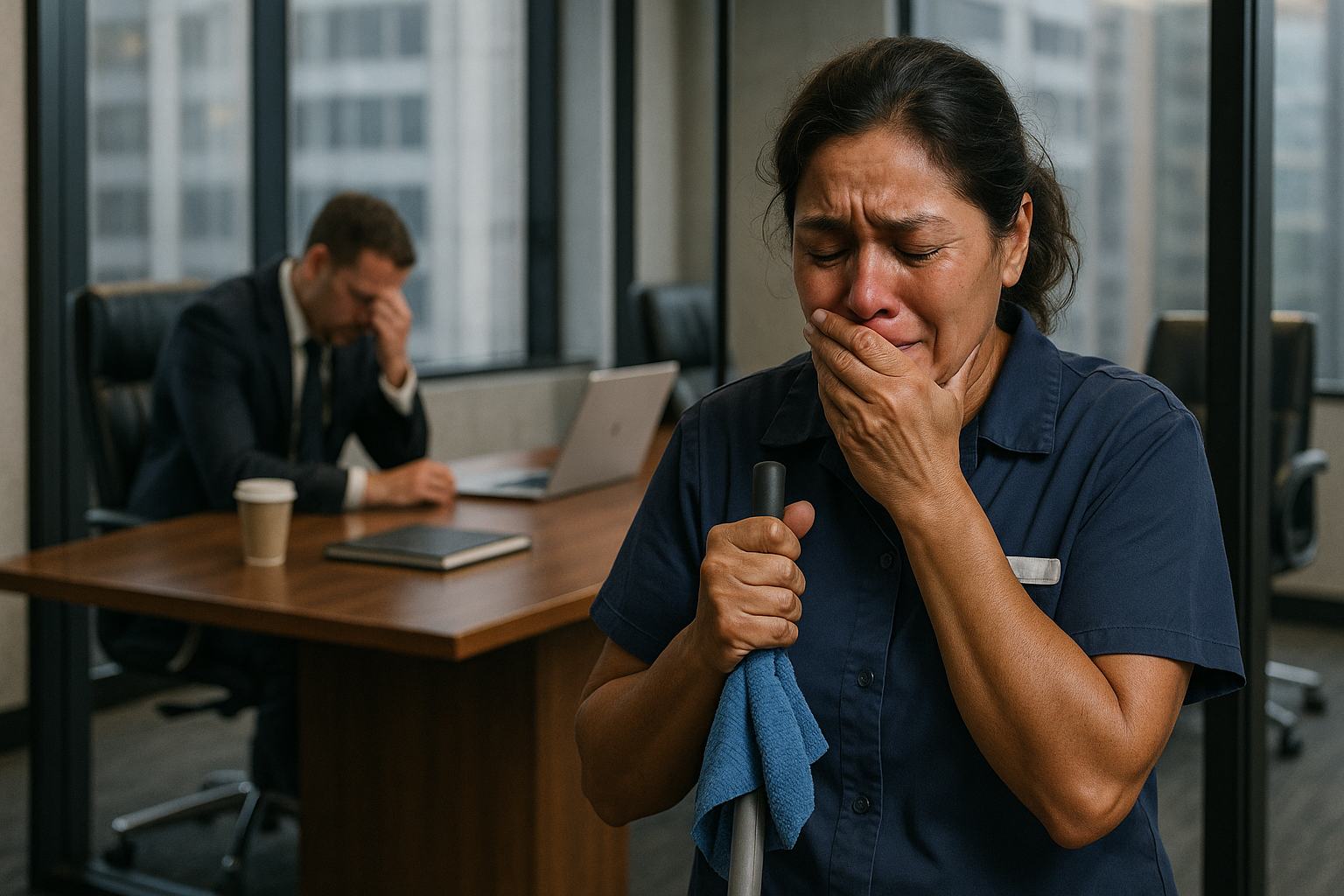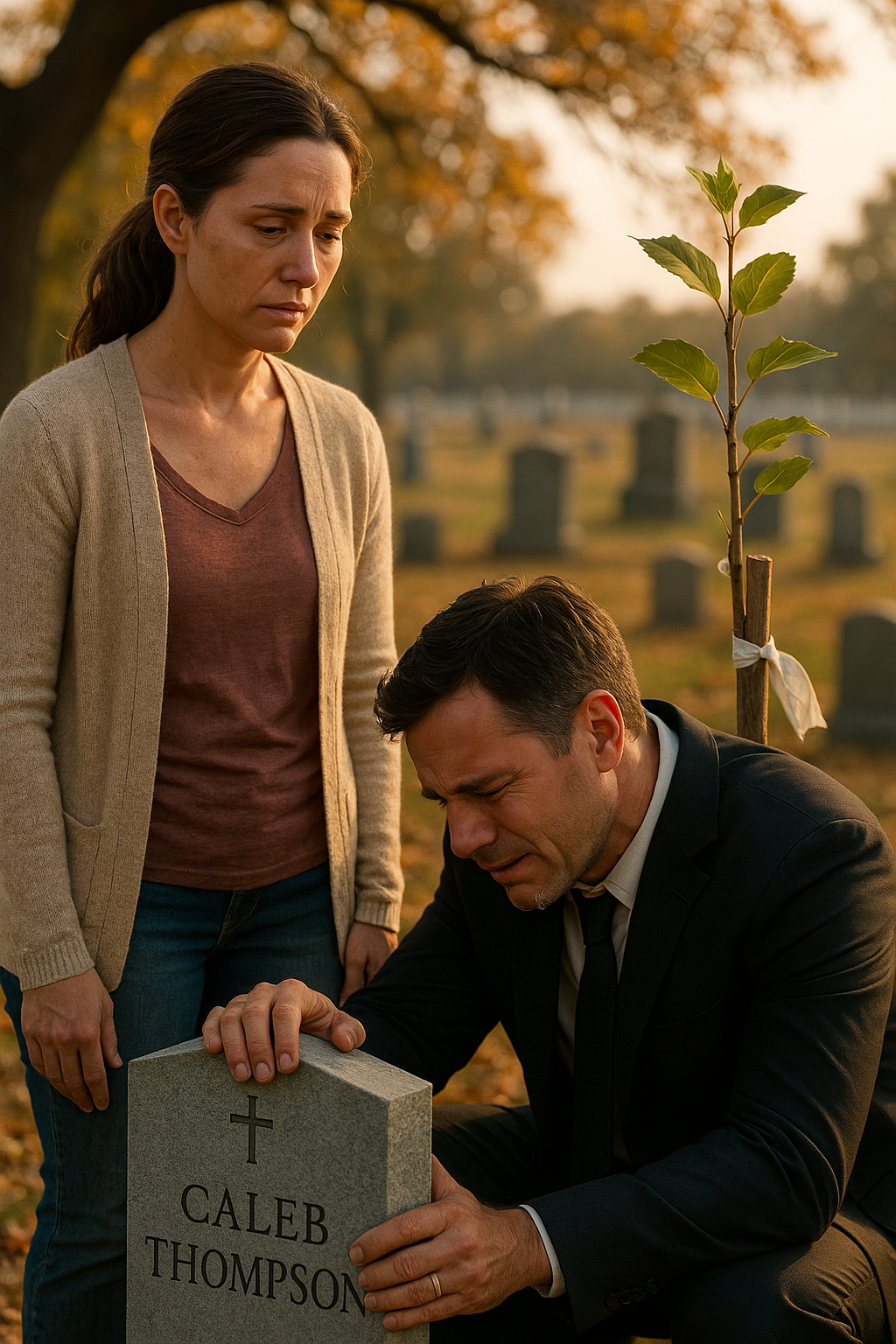
Sometimes the dust you wipe away is the same dust you swallow just to keep going. And silence? It becomes the only legacy left for a child the world refuses to see.
My name is Maria Thompson. For years, I swept and mopped the office of a man who never knew his greatest mistake had a name, a face—and a resting place.
I was seventeen when I found out I was expecting.
It was my senior year at Jefferson High School in Texas. I had dreams—finishing my education, going to college, building a better life. He was my classmate, Ryan Walker—confident, charming, and the son of a wealthy ranch owner. I was the mechanic’s daughter, raised by a single mom who worked double shifts as a waitress.
The day I told him, he froze.
“Are you sure?” he whispered.
“I’ve been with no one else, Ryan. He’s yours.”
After that, he never spoke to me again. A week later, I learned his parents had sent him to live with relatives in California “to focus on his future.”
One afternoon, my mom found the doctor’s note in my backpack.
“You want to bring shame to this house? Go find the father!” she yelled.
“Mom… I have nowhere else to go.”
“Then leave. There’s no place for you here.”
And just like that, I was on my own. Afraid. With nowhere to sleep except the back of a friend’s pickup truck, earning a few dollars cleaning diners and selling sodas at the county fair.
When my time came, I gave birth in a small trailer on the outskirts of town, helped by Mrs. Jenkins, the retired nurse who lived next door.
“Hold on, honey. Almost there,” she murmured, wiping the sweat from my face.
The baby arrived quietly, my hands clenched in pain and relief.
“What will you name him?”
“Caleb,” I whispered. “Because God’s promise still stands.”
Life was hard from the start. We shared borrowed blankets, cold nights, and days when dinner was nothing more than peanut butter on stale bread.
When he was six, he asked,
“Mom, where’s my dad?”
“He traveled far, son. One day he’ll come back.”
“Why doesn’t he call?”
“Maybe he lost his way.”
But the truth was—he was never coming back.
When Caleb was nine, he got sick. Fever, constant coughing, weakness. The doctor said,
“It’s a simple surgery, but it’ll cost ten thousand dollars.”
I sold my wedding ring and my old car and begged churches for help. Still, it wasn’t enough.
I b.u.ried my boy alone, wrapping him in his favorite blue blanket with a faded photo of his father tucked beside him.
“I’m sorry, baby. I didn’t know how to save you.”
Five years passed.
I moved to Houston, looking for a fresh start, and found work as a night cleaner at Walker & Co. Investments.
“Gray uniform, night shift, no talking to the executives. Just clean,” my supervisor instructed.
On the top floor was a spacious office with glass walls and leather chairs. The nameplate read:
Ryan Walker – CEO.
My knees weakened.
“It can’t be…” I whispered, gripping my mop.
Ryan looked different—older, broader, wearing a tailored suit, the air around him scented with expensive cologne. But his eyes were the same—sharp, proud, as if the world owed him something.
I cleaned his office every night. Straightened his papers, polished his desk, and emptied his trash. He never really saw me.
One afternoon, as he moved some files, my name badge slipped from my pocket.
“Maria?” He read aloud. “Sounds familiar. Ever live in Dallas before?”
I forced a smile. “No, sir.”
He didn’t press. Just went back to his emails, as though I were invisible.
That night, I overheard him joking in the conference room:
“Back in high school, I got a girl pregnant. She swore it was mine. But you know how small-town girls can be—they’ll say anything.”

Laughter erupted.
I dropped my mop and ran to the bathroom, where I cried until my chest hurt.
“Why me, Lord? Why me?”
Later that night, I wrote a letter with shaking hands:
You may not remember me, but I remembered you every night I watched our son struggle for breath. You never came back. But I cleaned up your mess every day—first in life, and now, on your floor.
I folded it and slipped it under his coffee mug.
The next day, I requested a transfer. I couldn’t bear to see him again.
Two weeks later, a woman knocked on my door. She was dressed in white, graceful and composed, her face carrying a softer version of Ryan’s features.
“Are you Maria?”
“Yes, ma’am.”
“I’m Ryan’s older sister.”
I froze.
“He cried when he read your letter. He didn’t know. Our parents told him you… ended the pregnancy.”
“No,” I said quietly. “Caleb lived for nine years. He d!ed still waiting for his father.”

Her eyes filled with tears.
“Ryan went to the cemetery. He found your son’s grave. He wants to see you—not for an apology, but to make things right.”
We met at the cemetery, under the oak tree where I had once buried my boy.
Ryan came in silence, his shoulders heavy.
“Maria…”
“Don’t say anything.”
He knelt beside the grave and wept like a child.
“Forgive me, son. You were never a mistake.”
We planted a small sapling beside the gravestone.
“What would you have wanted Caleb to be?” he asked.
“A good man,” I replied. “Like the one you still have a chance to become.”
From then on, Ryan changed.
He funded a program for teen mothers expelled from school, naming it Caleb’s Place.
“No girl should go through what you did,” he told me, inviting me to visit.
It was a modest building, but filled with laughter. A mural showed a mother lifting her child toward the sky.
Ryan began sending me a monthly allowance. I never asked.
“It’s not charity, Maria. It’s justice.”
I still live simply. I cook, sweep, wash clothes. But now I sleep with a lighter heart.
I told my story. And someone finally listened.
One day, a girl with long braids and a shy smile asked,
“Are you Caleb’s mom?”
“Yes, sweetheart. Why?”
“I want to be like you—strong, even when I’m scared.”
I hugged her.
“You already are. You just have to believe it.”
Sometimes Ryan calls to ask about the girls. He talks less now, listens more.
“Thank you, Maria,” he said once. “For giving me a second chance to be a father—even if it’s to children who aren’t mine.”
In the program’s main hall, a plaque reads:
Caleb’s Place — So that no mother sweeps away her loneliness, and no child is invisible.
I don’t know if full forgiveness is possible.
But I do know this: silence no longer owns me.
And when I sweep the courtyard now, I do it with my head held high.
Because sometimes, the dust you clean away is the same dust you once swallowed to survive.
But when you speak your truth, that dust becomes a seed—
and from it, trees grow, offering shade to others.